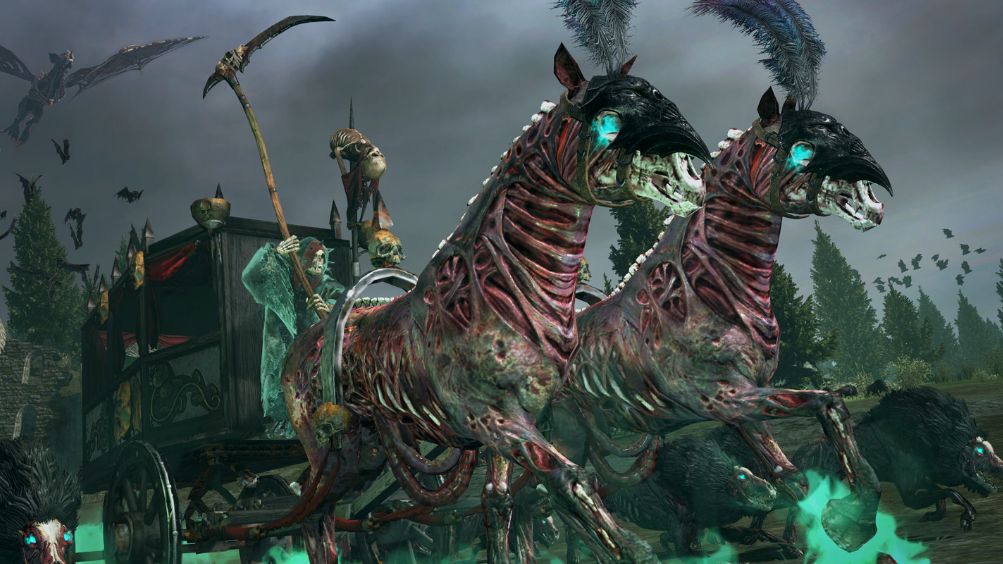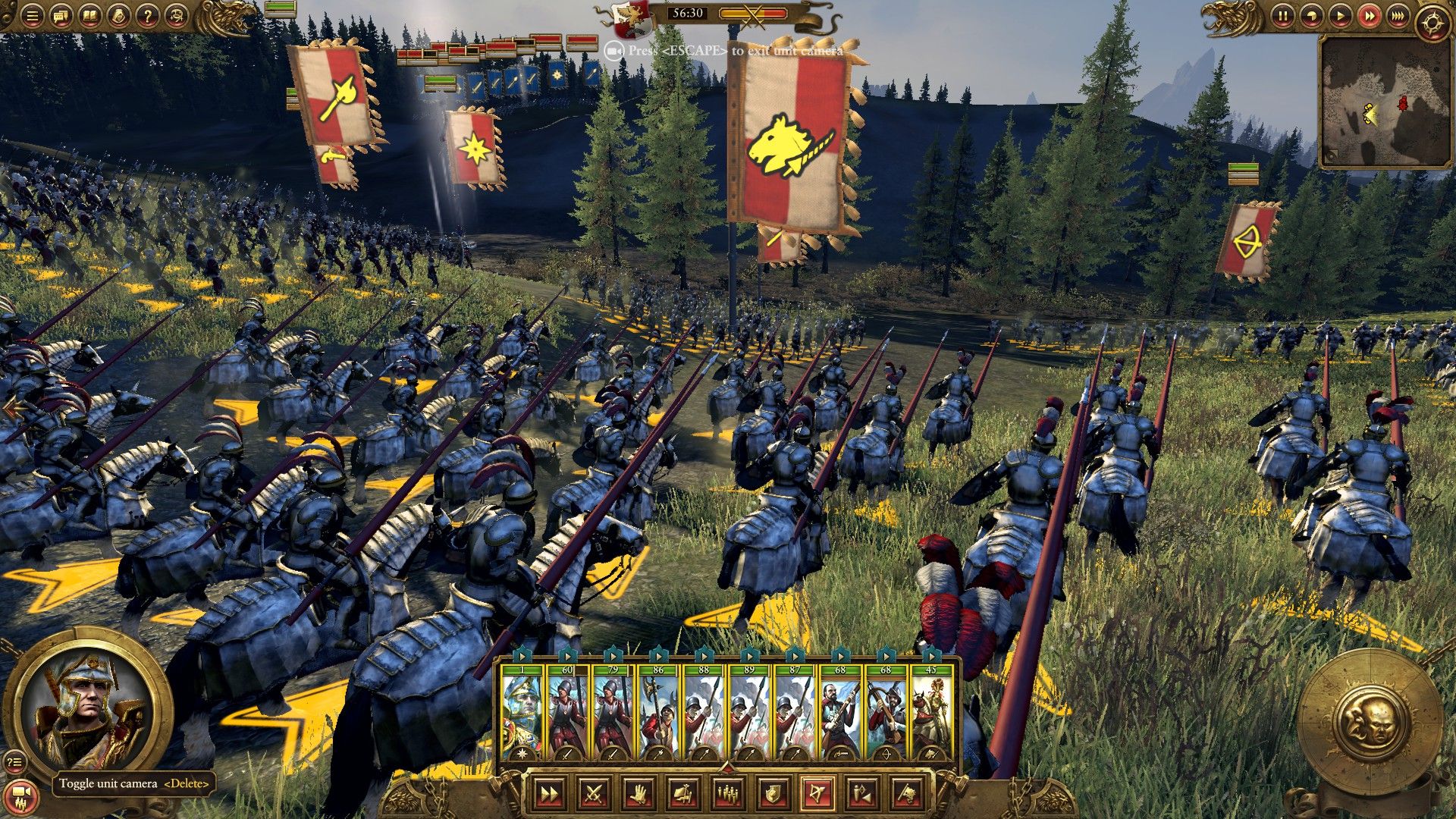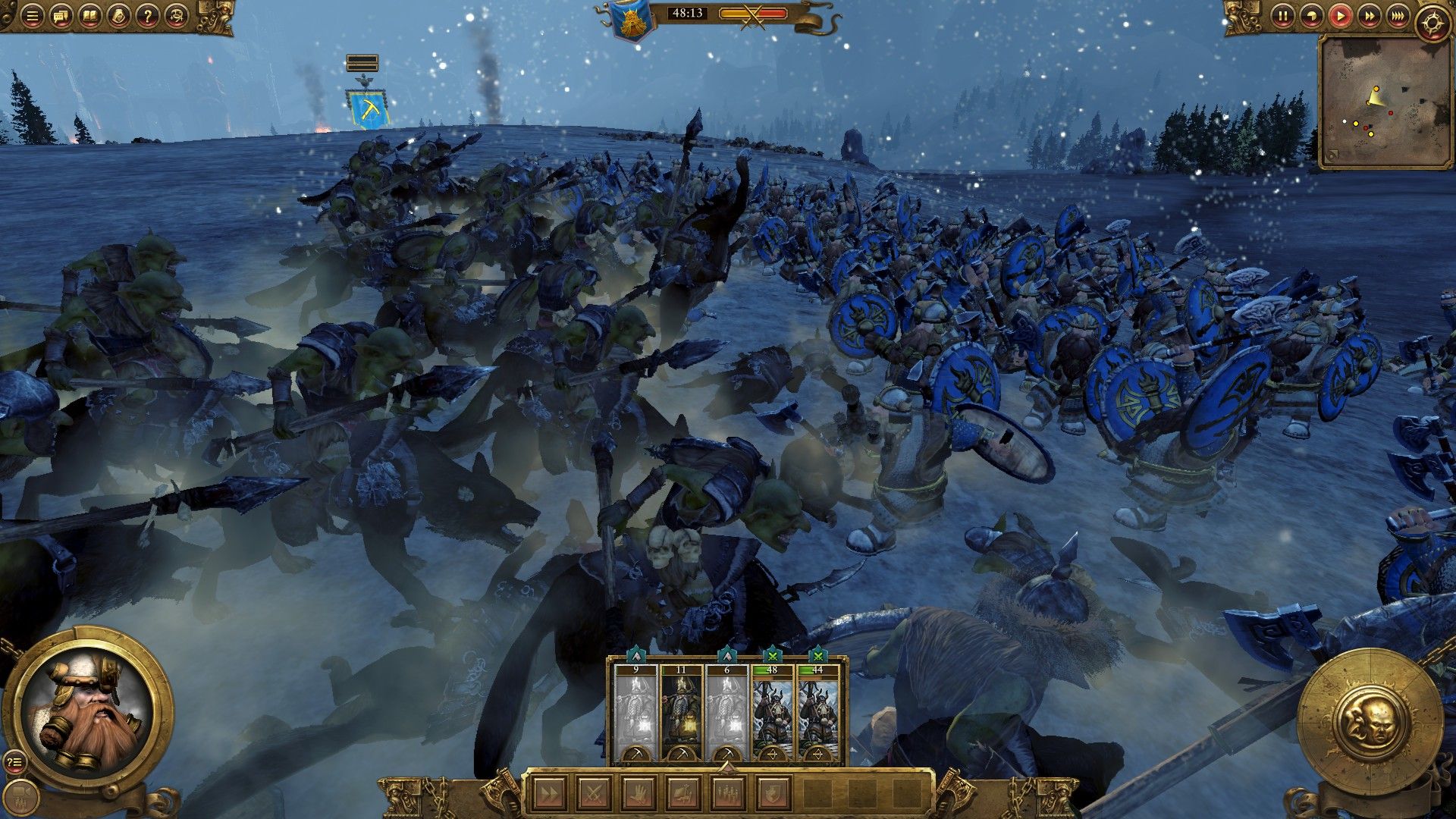Total War: Warhammer beginner's guide
New to Total War? Here are some top tips to get you started.

If you haven't played Total War before but the Warhammer World has drawn you in, you've got a little learning ahead of you. While the series has never been as complex as something like Crusader Kings II, it does a language that has accumulated over the years.
If you have played earlier Total War games, Total War: Warhammer does a few things simpler than you might expect. Rather than setting precise levels of taxation it's now an on/off toggle for each province, and thanks to a short timescale there's no worrying about rulers getting old, or armies suffering attrition every winter.
Instead, it places its complexity elsewhere—in unit variety and faction abilities. Plus, siege battles have been revamped, and magic and flying units make a significant difference. No matter which side of things you're more familiar with, you could probably do with some pointers.
Make things Easy for yourself
The first decision you face is which of the four factions to try. While they're rated on the difficulty of their starting position, don't let that sway you. Instead, choose the one that sounds most interesting and, especially if this is your first Total War, set the difficulty to Easy. Don't let Internet Tough Guys hear this but you're not actually robbing yourself of anything but empty bragging rights.
If you've played XCOM you'll be familiar with satellites, an essential tool for saving the world that the necessity of only becomes obvious after you lose your first game because you didn't have enough. Total War: Warhammer has a campaign full of satellites: things you'll underestimate the importance of to your detriment. May as well give yourself an advantage on your first playthrough while you're learning to avoid these traps.
To hell with the tutorial enemy
Each faction begins at war with one neighbour: Vampire Counts have Templehof; the Empire have Empire Secessionists; Greenskins have Red Fang; and for Dwarfs it's Bloody Spearz. Your first battle against them will be simple, but then the survivors flee. If you have enough movement left to pursue and attack again, absolutely do that. If you don't they'll either fortify a settlement or regroup alongside that opponent's other army, which is usually nearby, and attack you. I lost Azhag The Slaughterer by turn two thanks to this, which is just embarrassing.
If you can't catch your enemy (they'll be inside the yellow circle around your general if within range), switch to the marching stance and run back across your border. Your troops automatically replenish within those borders and you'll be ready to either retreat into a settlement or attack again soon.
Keep up to date with the most important stories and the best deals, as picked by the PC Gamer team.
Several turns later when you have the tutorial enemy on the ropes they'll probably sue for peace, even offering money. Turn them down. If you sign a treaty you'll have to awkwardly expand around them and they'll probably betray you later on anyway, so obliterate them while you can.

Prepare for battle
Deployment is important, as Total War: Warhammer does a pretty good job explaining. You want infantry units near ranged units to protect them from charges, and cavalry on the flanks to race forward and lap around the edges. Generals should be placed centrally so their Leadership bonus can affect as many soldiers as possible and put into combat ASAP. Vanguard units can be placed in no man's land between deployment zones, and if they also have the Hide ability like Dwarf Miners or Forest Goblin Spider Riders, they can be camouflaged in forests to burst out and flank units as they pass.
Thanks to flying enemies it's worth leaving one unit at the back near your artillery to protect them from being tangled up in melee when they should be causing as much damage as possible. The Vampire Counts' cheap Fell Bats are particularly annoying for this but all it takes is one unit of infantry at the rear to drive them off.
Even before deployment there's prep to do. Banners should be assigned to specific units on the pre-battle screen, and if you know you're about to get into a big scrap next turn, now is the time to make sure heroes have the right magic items and followers–it takes one turn to reassign them if a hero who is in the wrong place happens to have your protective Dawnstone.
Don't expand early
The enigmatic advisor gives you a mission after you've defeated your first few settlements to take 12 more. Ignore the crusty idiot. That's a long-term goal and if you chase it right away you'll set yourself up for all kinds of problems. Because of the way Total War: Warhammer's economy works you can only afford a single powerful army at the start (unless you play Greenskins, with their free Waaagh! armies and cheap upkeep), and can only realistically be at war on a single front until mid-game. If you push outwards too fast you won't be able to protect yourself, and will also fall victim to the enemy within.
Each faction has to worry about public order–even Vampire Counts have peasants living at the foot of their castles, paying the Blood Tax and locking their doors at night. Occupying a settlement results in an immediate hit to happiness that takes time to go away, and if you don't mitigate it with the right buildings, a garrison army, or a character with the right followers and abilities it will lead to rebellion, forcing you to fight at home as well as away.
When you do expand, keep this in mind
When choosing who to attack it's worth taking settlements that make up part of a province you already hold part of, like completing a set in Monopoly. Controlling an entire province gives the ability to issue Commandments, one of which is a handy boost to public order. Once the people are happy you can switch to one that boosts growth or whatever else you need.
In the meantime, sack settlements rather than occupying. It pays cash money, and the damage to buildings and public order are your enemy's worry. By the time you get around to attacking again to occupy them they'll probably have repaired the damage, and since happiness is reset when you conquer it's not your problem. You can even sack settlements your species isn't allowed to occupy–Dwarfs and Greenskins can take each others' homes and the Empire share theirs with Vampire Counts, but the others are still worth looting.

Every building in its right place
Each province has a capital that can be upgraded to tier five, the top of the tree. That's where you should construct buildings that eventually produce elite units, because you can only upgrade a building to the same tier as the settlement itself. It's usually a waste to spend money and time on a barracks in a minor settlement that tops out at tier three, because those buildings need to reach tier four or five to produce the best units. If you capture a settlement with redundant buildings you may as well demolish them to make space for something that produces income instead.
One exception is the building that provides a boost to public order (Tap Room for the Empire, Boss Tent for Greenskins, Refectory for Dwarfs, Gibbet for Vampire Counts), which is worth building even where it can't be upgraded just to boost your citizens' baseline happiness.
A quick siege is a good siege
If you're used to older Total War games you'll be familiar with walking a besieging force up to a city and then opening fire as far away as you can. Total War: Warhammer does away with this phase: every siege starts with the attacker in range of the defender's towers. Besiegers have to run straight up to the walls, getting a battering ram or large monster to the gates and using infantry's ladders–they all carry them, don't ask where–to scale the walls. It's still worth peppering the defender with missile fire, but don't rely on it to carry the day.
As the defender, target whichever siege tower is in the lead with artillery as you can usually destroy one of them before they reach the walls. The rest are likely to make it, so pull back archers once they do and get your own infantry into the fight. Your ranged units will also need to target fliers, and your own fliers can help take them down too.
Diplomacy is a bank
Friendly factions will offer you money to declare war on their enemies, and soon afterward those enemies will offer you money to sign a peace treaty. Take it. Then your allies will bribe you again and the whole cycle will repeat with no consequence to your reputation. Need cash? Declare war and wait.
Right now the exploitable diplomacy feels likely to be patched, so take this advice with a grain of salt if you're playing after day one.
Final tips
We'll have guides tailored to individual factions going up over the next week, and YouTube has you covered as well. On the official Total War channel Slayer's Guide videos pinpoint the weaknesses of specific monsters, and if you've got several hours to spare YouTubers like THFE Productions, Pixelated Apollo, and HeirOfCarthage are recording campaigns. If cheesing AI weaknesses is what you're into, LegendofTotalWar has that covered.
Two last miscellaneous tips. There's an option to teleport directly to a quest location if you have 5,000 gold, and that may be worthwhile when distant quests appear. Also, if you're not playing on Legendary difficulty you should save as often as possible. Some people call saving and reloading whenever you need to “savescumming”, I call it saving and reloading whenever you need to.
Good luck conquering the Old World. You'll need it once Chaos arrives.

Jody's first computer was a Commodore 64, so he remembers having to use a code wheel to play Pool of Radiance. A former music journalist who interviewed everyone from Giorgio Moroder to Trent Reznor, Jody also co-hosted Australia's first radio show about videogames, Zed Games. He's written for Rock Paper Shotgun, The Big Issue, GamesRadar, Zam, Glixel, Five Out of Ten Magazine, and Playboy.com, whose cheques with the bunny logo made for fun conversations at the bank. Jody's first article for PC Gamer was about the audio of Alien Isolation, published in 2015, and since then he's written about why Silent Hill belongs on PC, why Recettear: An Item Shop's Tale is the best fantasy shopkeeper tycoon game, and how weird Lost Ark can get. Jody edited PC Gamer Indie from 2017 to 2018, and he eventually lived up to his promise to play every Warhammer videogame.

